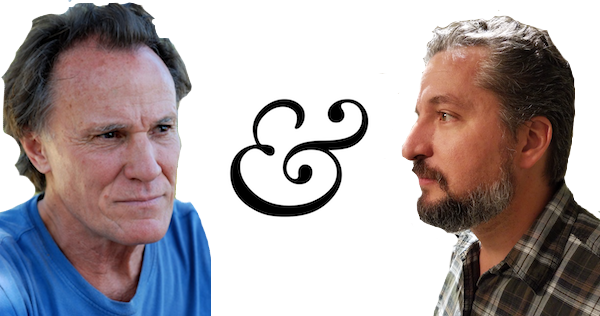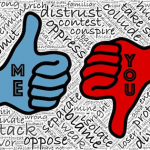
LUKE MOON (Evangelical Christian): So I guess we are supposed to say something interesting.
FRANK SCHAEFFER (former Evangelical Christian): Well we are supposed to not agree on anything, so in keeping with our present day “Trump Reality,” let me just say this: Luke, you no good slut, how are you? And what’s on your mind?
Luke: Ha. Yeah, and you’re just a progressive lacky. LOL Ok, now that we have that out of the way, I’m good. Pretty fed up with the election. Frosty friendships and all.
Frank: So let’s talk about something else… How do you describe the difference between your official self… and the real you? Me, I talk about a journey and all that, but of course nothing really changes… positions on politics and religion are labels. Inside I’m still me, just older and tired. You?
Luke: That’s a great question. I tend to be more confrontational in my public profile, while interpersonal relationships are more mellow. I kind of see this modeled by Jesus. The Sermon on the Mount is very different than the dinner with Zacchaeus.
Frank: Same here… and of course as soon as I say something or write it that sounds like I believe it, and really I’m never entirely sure. Do you actually believe what you say “officially”? Or are you in there somewhere wondering if you are full of it? I’ve changed my mind before, so how can I be so sure now on anything?
Luke: I think I do actually believe what I say, but like anyone who does this stuff, I like to give myself a little wiggle room. I think there is a difference between changing one’s mind and not really believing what one says in the first place.
Frank: On the other hand, we don’t just change our minds, we change the way we see things. That’s one reason I’m a better grandfather than I was a father. I’m less certain now but kinder. So I’m sure kindness is better, not because of a book or idea but because of what I see written on the faces of the children (grandkids) I’m caring for every day while their parents work. This is less a change of mind than a learning of a little practical wisdom maybe.
Luke: Sure, I don’t think being certain about something is antithetical to being kind. For both of us, though, I suspect the types of conversations we have with our kids and grandkids are not the same kinds of conversations we have on social media. Neither of us would likely be accused of being kind on Twitter. It’s hard to do nuance in 140 characters.
Frank: Depends how much one is drinking! I just think the way (for instance) evangelicals talk about God or Jesus, as in “Jesus says” or “the Bible says” points up a lack of honesty. All we know about Jesus is what someone else wrote down… so really one should say, “Here is what someone wrote down that they said Jesus said…” this isn’t uncertainty on purpose, just plain speaking.
And by the way, secular people do the same thing: “Science says…” etc. Science “says” nothing. People say things and knowledge changes. When I was a child, my parents taught a literal creation. By the time I was in my 20s they were accommodating evolution. In other words, less creed, more roll with changing ways of seeing. Maybe adapting is a better way to see this. Make any sense to you?
Luke: It makes sense, but I don’t think that we, the gospel writers, or scientists are just blind men describing an elephant. You know how that analogy goes…. one grabs the leg and says the elephant is like a tree, another grabs the trunk and says an elephant is like a hose, yet another grabs the tail and says an elephant is like rope, another presses on the side and says an elephant is like a wall. I think we have a couple of choices: we can believe we are like the blind men (relativism) or we can believe that there is someone who can see (truth).
I don’t think we are the gospel writers, I just suck at grammar.
Frank: I don’t think anyone sees truth for a simple reason: we aren’t static. We are not evolved but evolving. Take empathy, something added to human nature very recently and moving as we speak. Less than 300 years ago, Christians were enjoying watching a bear and dogs fight in a pit, racing Jews like horses, and had a life expectancy of less than 50 years. Today there are vegans who won’t kill a fly, and yet wars too… So my point is that we are always in transition. My problem with all forms of fundamentalism is that the position is fixed. This is like talking about a fixed position as seen from a moving jet: it’s disappearing over the horizon with or without your permission. The way even movements change is stunning: Chinese communist capitalists? Evangelicals deciding to be nice to gay people?
I’d put it this way: Beliefs should be like the rest of life, and real life isn’t rules but learning and adaption. By the way, we’re up to 1000 words, want to put me in my place then call it a day? I could do with a beer.
Luke: It learning and adapting within a framework. There are also laws of nature that are fixed, fundamental truths of human nature. Sure we have (in some places) adapted on things like dog fighting, but we are no closer to ending war, poverty, hate, racism, and the myriad of injustices that fill the news every day. Heck, this election is proof that the heart is desperately wicked.
Frank: I’d just say this… laws of nature don’t know they are “fixed.” That’s a human pattern seeking description that comes out of our need to survive. It isn’t an objective description of anything. We have no outside point of view. We are nature too.
Luke: We’ll have to take turns on who gets the last word. :- )
FRANK SCHAEFFER is an American author, film director, screenwriter and public speaker. He is the son of the late theologian and author Francis Schaeffer. He became a Hollywood film director and author, writing several internationally acclaimed novels depicting life in a strict fundamentalist household including Portofino, Zermatt, and Saving Grandma. His latest book is Why I Am an Atheist Who Believes in God.
LUKE MOON is the Deputy Director of the Philos Project, a network hub for leaders and future leaders committed to promoting positive Christian engagement in the Middle East. Luke has served as business manager for the Institute on Religion and Democracy and as a missionary with Youth with a Mission. He holds a BA in Biblical Studies from the University of the Nations and an MA in Global Politics from Regent University. Luke is also an ordained Southern Baptist minister.










